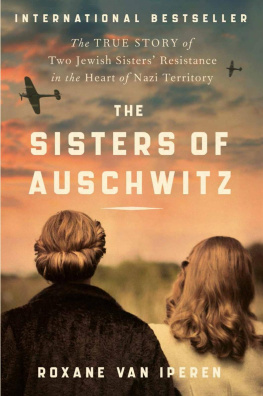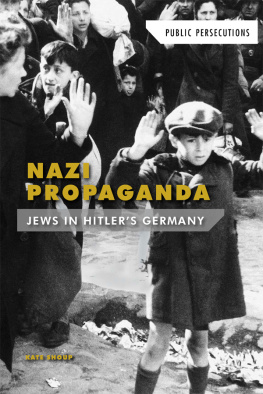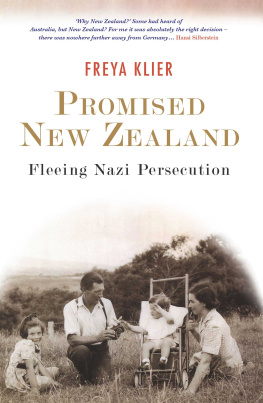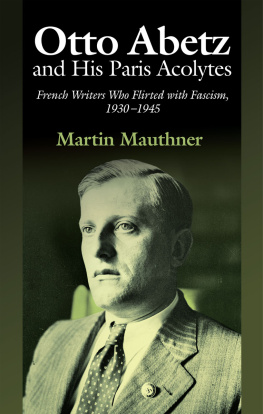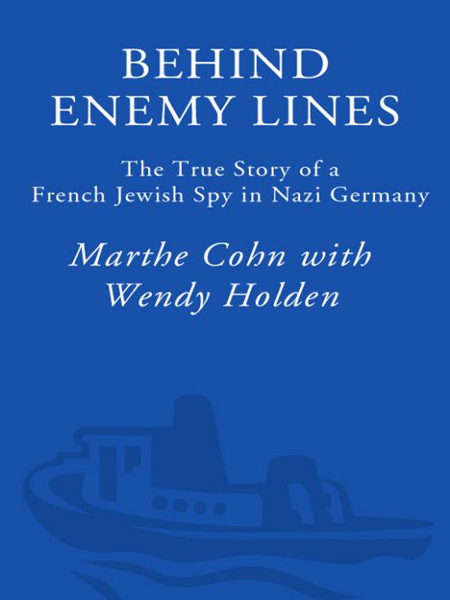
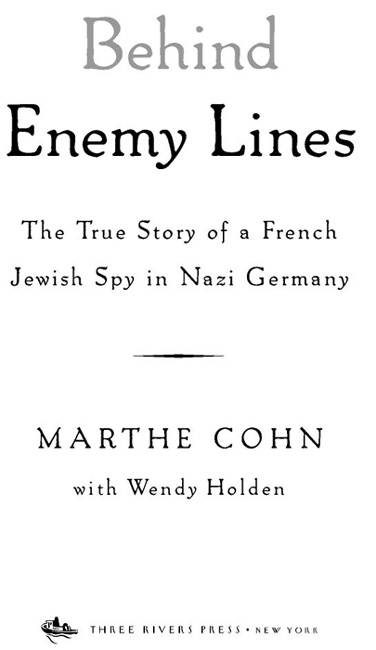
Table of Contents
To my family, the living and the dead,
but especially my grandfather, mother, and
brother Fred, who were its soul
Each of our deeds, even those as small as the flapping of a butterflys wings, has great consequences.
RABBI ABRAHAM J. TWERSKI
Acknowledgments
Marthe Hoffnung Cohn: Our family has recently been stricken with the loss, within three weeks, of my brother Fred and his oldest son Maurice. Fred, the oldest of eight children, was, as long as I can remember, a role model and hero to all of his siblings. During the war, though newly wed, Fred ensured the survival of his extended family while actively engaged in the Resistance in the Cantal. His son Maurice, born in February 1942, often complained about the Germans as an eighteen-month-old baby when he was repeatedly lifted from his crib and carried into hiding when the Nazis came to round up Jews. He may well have been scarred for life by these early traumas. On June 28, 2001, this highly successful professor at the Pasteur Institute in Paris committed suicide, leaving a loving wife and three beautiful children.
In 1942 my entire family was devastated by the arrest and deportation of my sister Stphanie. In prison and in the Poitiers camp, she became the leader of her fellow prisoners. Her courage and determination were exemplary. In the letter she wrote the day she was deported from Pithiviers to Auschwitz, her chief concern was her mother. Fred carried that letter in a pocket over his heart for the rest of his life.
Briefly, I want to acknowledge the gallantry of all members of my family during those five years of terror. First, my parents, who, though torn by grief and worry during the entire war, never complained about or discouraged our participation in acts of resistance. My sister Cecile lived undeclared as a Jew in Paris and continued to work in order to help Fred feed our extended family. Like Fred, my brother Arnold was actively engaged in the Resistance in the Cantal and participated in the mad dashes to the mountains to escape arrest during the frequent roundups of Jews. The two brothers took turns carrying our grandmother on their back, as well as Jacquie and Maurice. My sister Hlne, a student at the University of Clermont-Ferrand, used her rented room as a safe house for fellow Resistance members and to print anti-German propaganda. She also transported arms and ammunition. Rosy, our baby, was a scout for the Cantal Resistance and was assigned to man a machine gun on a mountain road. Finally, my sister-in-law, Rosette, saved the village of Narnhac from being burned to the ground by the Germans after the arrest of a wounded Resistance member and the ensuing execution of the mayor and several hostages.
Of the numerous people who helped my family survive the German occupation in Poitiers, I am most grateful to my classmates, particularly Odile de Morin, and to the staff of the Red Cross Nursing School; to Monsieur Charpentier, neighbors whose names I forgot, and the owners of the food stores, all of whom, at the risk of their lives, voluntarily provided shelter, forged identity documents, stored our belongings, or sold food to the undesirables we had become. I would be remiss not to mention my then fianc, Jacques Delaunay, for his constant encouragement and wholehearted support of my nursing career and the planning of my familys escape. With love and sorrow, I wish to mention Jacquess parents, George and Amelie Delaunay, whose two sonstheir only childrenwere executed by the Germans in 1943. I remember with gratitude Madame Keller in Marseille, who refused to obey Vichys rules and ordered the Red Cross Nursing School to admit me, thus permitting me to complete my training. Most Jews who survived the war in France were helped by such non-Jews who risked their lives to save their fellow human beings. My deepest gratitude to all of these unsung heroes.
To Lieutenants Latour and Verin, thank you for training me day after day when I was assigned to your antenna. I will always remember the gentleness and fairness of Robert Talichet and the great pleasure it was to work with him in Lindau, Bavaria. Thank you, Captain Jean Millot, the antenna chief who replaced Zimmerman; it was great to be part of your team. We worked hard, but you and your charming wife knew how to create a lively social life in the former villa of Julius Streicher, in the Officers Club where we spent so many evenings, and in Austrias ski resorts that winter.
A special acknowledgment is due to Colonel Bouvet and his men for treating me as another commando and for believing in me. As I could not disappoint them, I found the courage to walk into Germany. For the spur to that courage, I wish to thank Captain Mollat for earlier doubting me. A note of thanks is due to Major Petit, who had enough confidence in a young woman in civilian clothes to immediately transmit to his superiors the intelligence I provided. I also thank Majors Ryussen and Rigaud, Captains Ligouzat, Metivier, and Ducournau, and Lieutenant Neualong with Colonel Bouvet and Major Petitfor their long years of friendship, which I returned with great loyalty.
From my stint in Indochina, I vividly remember my numerous friends in the French Foreign Legion, who, among many good deeds, provided us with the equipment we needed, served as baby-sitters for Serge, and, as often as our heavy schedules permitted it, sent small tank convoys to carry us to their jungle posts for dinner. These friendly invitations eased our isolation and hardships in a country so far from home. I also want to thank Captain Suzanne Tillier, a former commando officer and chief of all of the women serving in Indochina, for her hospitality and friendship during my several visits to the South Annam capital.
Though my brother Fred had encouraged me to write this book for well over twenty-five years, it was only after my retirement in 1999 that I gave serious consideration to the project. In summer 2000 my original coauthor, Suzanne Singer, and I started writing the first chapter. It was a delightful collaboration that I thoroughly enjoyed and the beginning of a lasting friendship. When, on July 14, Bastille Day, I was conferred the Medaille Militaire by the Los Angeles French Consul General, Suzanne unleashed a blitz of publicity. Thanks to her I also met Robert A. Mirisch to whom I am immensely grateful for his competent legal advice, generosity, and integrity.
Special thanks are due to the late Ted Demers who, believing that my story merited publication, committed himself to the realization of this project. Without Ted Demerss financial, technical, and moral support, Behind Enemy Lines would never have been written. While both were involved in preparing the contract, my legal counsel, Robert Mirisch, marveled at the high business ethics and efficacy of Ted Demers. I deplore the untimely death of that truly traditional Maecenas.
I am also grateful to Alan Nevins of The Firm for his efforts on my behalf. Particular thanks go to British author Wendy Holden, who took over the cowriting from Suzanne when she left to attend rabbinical school. In just eight months, our collaboration resulted in the growth and transformation of that initial chapter into a fully completed book. Thank you, Wendy, for your unusual empathy, patience, and understanding. By now you probably know more about my life than any of my close friends.
I am also grateful to Harmony Books for their encouragement at every stage of the work.
Next page

